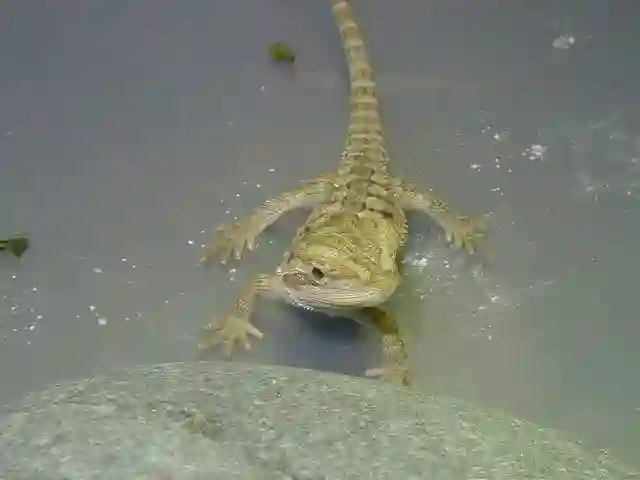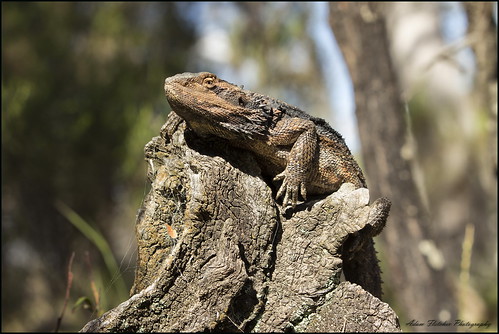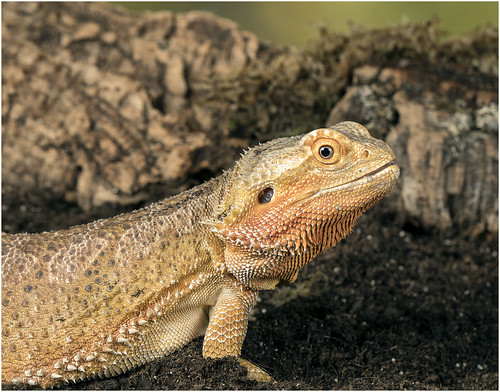Have you ever noticed your bearded dragon acting more sluggish than usual? It’s not uncommon for bearded dragons to act lazy or lethargic sometimes. But it’s important to understand the difference between the two behaviors and the possible causes.
These are a few possible causes:
One is diet – if they’re not getting the right nutrients, they can become lethargic. Another is their environment – temperatures that are too low or other conditions that are not ideal can sap their energy. Internal parasites can also be the culprit, draining their energy.
In winter, bearded dragons may experience a period of brumation, in which they become less active and sleep more. This is normal and should not be a cause for concern.
Temperature can also be an issue. When it’s too cold, the dragon will become sluggish. Calcium and vitamin D3 deficiencies can produce jerky or shaky behavior.
Finally, if a bearded dragon is feeling lethargic, it’s possible that they are ill. If that’s the case, it’s important to seek help from a qualified veterinarian.
It’s important to take the necessary steps to make sure your bearded dragon is healthy and happy.
In this article, we’ll take a look at some of the common causes of lazy or lethargic behavior in bearded dragons. We’ll also explore some treatments and tips for helping your dragon regain its energy.
So if you’re worried about your dragon’s behavior, read on to learn more.
Key Takeaways
- Brumation and decreased feeding/water intake during this period can cause lazy/lethargic behavior
- Lack of proper heat and UVA radiation can also contribute to sluggishness and loss of energy/appetite
- Impaction and possible parasites can cause serious health issues and should be prevented/treated immediately
- Proper diet, hydration, heating/lighting, space, humidity, and routine check-ups with a qualified veterinarian are important for the health and well-being of bearded dragons.
Brumation During Winter Months
During the late fall and winter months, it’s common for bearded dragons to enter a state of brumation, which can make them appear lazy or lethargic – they may even sleep for days or weeks at a time!
Brumation is a natural process of hibernation and is common in older juveniles and adults. During brumation, bearded dragons tend to decrease or stop their feeding and water intake, and can become sluggish and inactive.
It’s important to be aware of brumation patterns and make sure your bearded dragon is prepared for it in terms of food, temperature, and humidity levels. Some bearded dragons may require a specific diet or supplemental vitamins and minerals to help them through brumation.
It’s also important to note that during brumation, breeding behaviors are reduced or eliminated, and the length of the brumation period can vary from several days to several weeks.
As such, it’s important to be aware of your bearded dragon’s brumation patterns and be prepared for it.
Dehydration
Dehydration can often result in a bearded dragon becoming sluggish and unresponsive. Preventing dehydration is essential to maintaining the health of your bearded dragon.
It’s important to be able to recognize the signs of dehydration in your bearded dragon so you can take the necessary steps to provide proper hydration. Signs of dehydration can include sunken eyes, dry skin, and a lack of appetite.
You should adjust your bearded dragon’s diet to ensure they’re getting enough hydration. This can include adding more vegetables and fruits with high water content to their diet. Additionally, it’s important to provide water bowls for your bearded dragon, even if it doesn’t seem like they’re drinking from them.
The Big Dripper can be a great tool to help encourage your bearded dragon to drink from their water bowl. The dripping action causes a rippling effect in the drinking water, allowing them to detect the water which can help them stay hydrated.
Bearded Dragon Acts Lazy Due to Lack of Proper Heat
When temperatures are too low, your beardie may just be too sluggish to move, losing their appetite and energy. It’s important to make sure they have the proper heating and lighting for their habitat.
It’s best to adjust the temperatures to a range of 75-85 degrees Fahrenheit in the basking area and 70-75 degrees Fahrenheit in the cooler area. Providing proper lighting is also key, as bearded dragons need UVB lighting to supplement their diet.
Increasing the humidity in the terrarium can also help your bearded dragon stay healthy and active. Lastly, make sure to provide your beardie with proper nutrition and enough space to move around and explore.
Offer them a variety of insects, vegetables, and greens to keep them energized and healthy. Taking these steps can help your bearded dragon stay active and energetic, so you can enjoy their lively personality.
Bearded Dragon Acts Lazy Due to Lack of UVA Radiation
Without proper UVA radiation, your beardie may become sluggish and lack the energy and appetite to stay active. If your beardie isn’t getting enough UVA radiation, it can lead to various health issues.
Here are some tips to ensure your beardie is getting the right amount of UVA radiation:
- Utilize UVA lamps, which provide the same UVA radiation as natural sunlight.
- Provide adequate calcium supplementation to prevent calcium deficiency.
- Take your beardie outdoors on sunny days to get a dose of natural sunlight.
- Make sure to make dietary changes to ensure your beardie is getting enough vitamins and minerals.
Giving your beardie the proper UVA radiation is essential for their health and energy levels. UVA radiation helps promote appetite and activity, so make sure your beardie is getting enough of it.
With the right amount of UVA radiation, your beardie will have the energy to be as active as ever!
Impaction Symptoms
If your bearded dragon isn’t moving much and seems to be dragging its hind legs, they could be suffering from impaction. Impaction is a serious health issue that can cause paralysis and even death if not treated immediately.
Possible impaction symptoms include bowel obstruction, loss of appetite, bloating, constipation, and lethargy. It is important to take preventative measures to avoid impaction.
This includes providing a proper diet, substrate, and habitat setup that’s suitable for your bearded dragon. If impaction does occur, treatment options include hydration, laxatives, and even surgery if necessary.
Common causes of impaction in bearded dragons include ingestion of foreign objects, poor diet, and inadequate hydration. If you notice any signs of impaction, such as bloating, constipation, or lethargy, seek medical help immediately.
Possible Parasites
If your bearded dragon has been acting lazy or lethargic, it could be a sign of possible parasites. Be sure to take a stool sample to a qualified veterinarian for analysis, as parasites are the most common cause of these symptoms.
Keep in mind that parasites can come from tainted food sources or very dirty living conditions, so make sure your bearded dragon is being cared for properly.
See A Veterinarian
If your bearded dragon’s been acting lethargic and you’ve noticed other signs of distress, it’s time to call your reptile vet and get them checked out. When dealing with a health issue with your beloved pet, it’s important to have a qualified veterinarian that you trust.
Here are some possible discussion ideas for ‘see a veterinarian’:
- Routine check-ups are important to ensure your bearded dragon is healthy and free of any parasites or other illnesses.
- It’s important to find a qualified veterinarian who’s familiar with the needs of a bearded dragon.
- It’s important to be aware of the signs of an emergency situation and contact your vet immediately.
- Vet bills can be expensive, so make sure you’re aware of the costs of any treatments your bearded dragon may need.
- It’s important to establish a preventative care routine with your vet to ensure your bearded dragon is healthy and happy.
Making sure your bearded dragon is taken care of is a priority, and establishing a relationship with a qualified veterinarian should be at the top of your list. A well-trained vet will be able to diagnose any health issues and provide the best treatment for your pet.
Frequently Asked Questions
How can I tell if my bearded dragon is lazy or lethargic?
Look for changes in your bearded dragon’s diet, environment, temperature, stress levels, or enclosure size. Pay close attention to their behavior for a few days. If they remain unresponsive and weak, they may be lethargic – in which case, seek help from a vet.
What should I do if my bearded dragon is acting lethargic?
If your bearded dragon is acting lethargic, look for signs of illness such as unusual symptoms and changes in temperature regulation. Make sure their diet is adequate and stress relief is provided, as well as a clean habitat. Seek help from a qualified veterinarian to get your dragon back to good health.
Is it normal for my bearded dragon to be lazy?
Yes, it’s normal for your bearded dragon to have lazy days. However, if it continues, you should consider bathing habits, diet changes, temperature drops, stress levels, and UV exposure to check if they are contributing factors. Be patient and pay attention to the details to ensure your bearded dragon is healthy.
How can I tell if my bearded dragon is dehydrated?
If your bearded dragon is not eating, has health issues, is not regulating its temperature, or is under environmental or dietary stress, it may be dehydrated. Monitor your dragon’s behavior and look for signs of dehydration, such as sunken eyes, dry skin, and lack of energy.
What should I do if I think my bearded dragon has a parasite?
If you think your bearded dragon has a parasite, take them to the vet for a regular check-up. Provide proper nutrition, stress relief, temperature control, and good hygiene to keep them healthy. These steps will help prevent parasites from taking over.



Leave a Reply